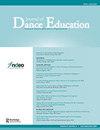“I Haven’t Got the Combination Yet!”: The Embodied and Emotional Experiences of Dancers with Dyslexia and Other Invisible Disabilities
Q1 Arts and Humanities
引用次数: 0
Abstract
ABSTRACT Forms of disability that are not noticeably embodied, known as invisible disabilities (ID), are a source of stress and stigma for individuals with such diagnoses. For dancers with dyslexia or other ID, the decision to disclose to a dance teacher, director, or choreographer can either reduce pressure for the dancer or create an adverse presumption of incapability. This article contains the stories of six dancers (four female and two male), from a Midwestern metropolitan city, representing Black, Latinx, and White racial demographics. The experiences shared by the dancers with ID reflect how they are perceived and treated in and out of the studio. They also reveal the importance of understanding dancers with ID and the numerous challenges they face while working hard to learn and function within this demanding field.“我还没有拿到密码!”:患有阅读障碍和其他无形残疾的舞者的身体和情感经历
残疾的形式不明显体现,被称为无形残疾(ID),是一个来源的压力和耻辱的个人与这类诊断。对于患有阅读障碍或其他ID的舞者,决定向舞蹈老师,导演或编舞透露可以减轻舞者的压力,也可以产生不利的残疾推定。这篇文章包含了来自中西部大都市的六名舞者(四女两男)的故事,代表了黑人,拉丁裔和白人种族人口统计。具有ID的舞者分享的经历反映了他们在工作室内外是如何被感知和对待的。他们还揭示了理解舞者与ID的重要性,以及他们在努力学习和在这个要求苛刻的领域发挥作用时所面临的众多挑战。
本文章由计算机程序翻译,如有差异,请以英文原文为准。
求助全文
约1分钟内获得全文
求助全文
来源期刊

Journal of Dance Education
Arts and Humanities-Visual Arts and Performing Arts
CiteScore
1.80
自引率
0.00%
发文量
47
 求助内容:
求助内容: 应助结果提醒方式:
应助结果提醒方式:


